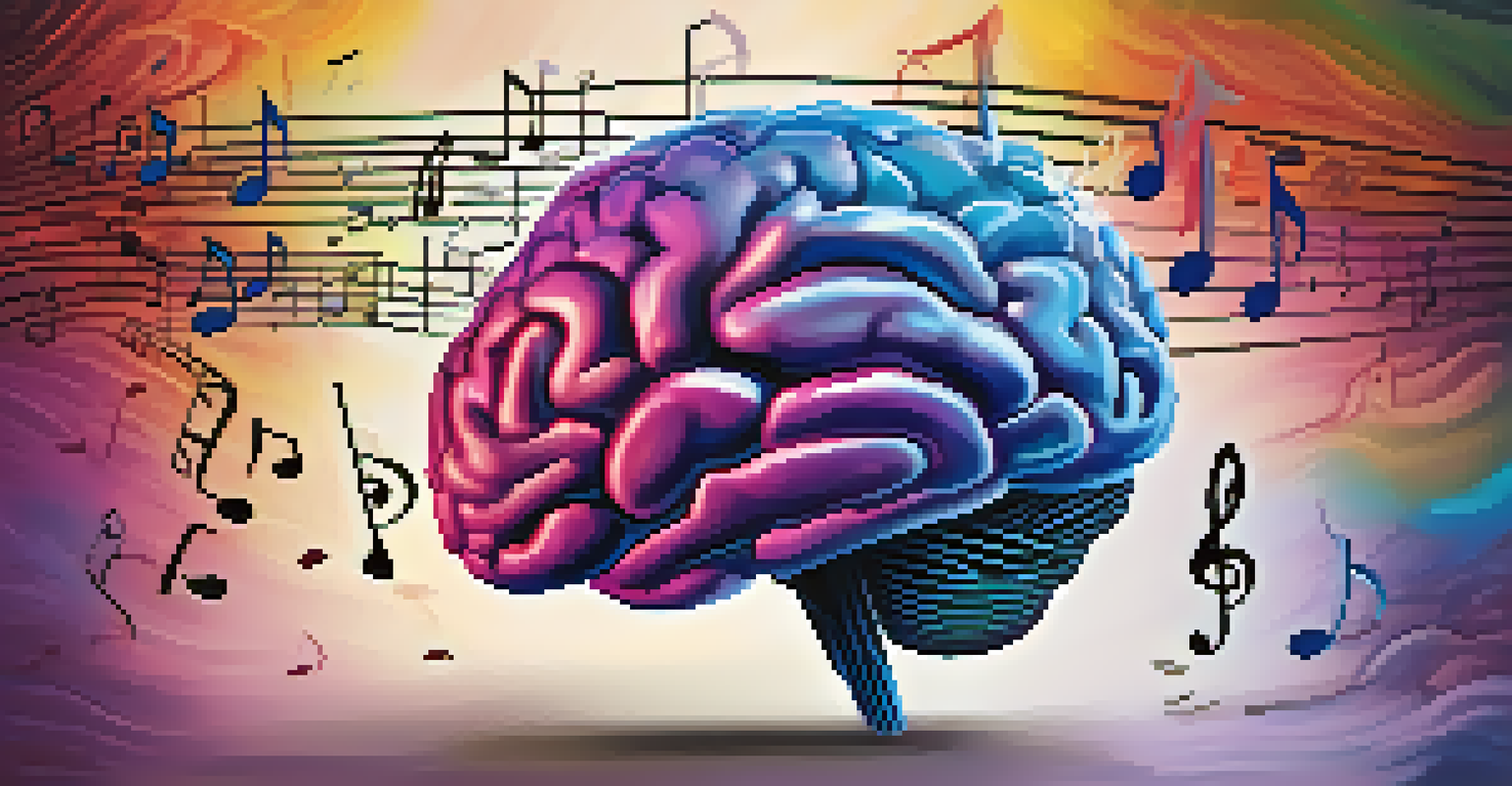How Music Influences the Encoding of New Information

The Connection Between Music and Memory Retention
Music has a unique ability to trigger memories and emotions, which can enhance our learning experiences. When we listen to music, it engages various parts of our brain, including those responsible for memory. This connection allows us to form stronger associations with the information we are trying to learn.
Music can change the world because it can change people.
For example, think about a song you loved during a significant time in your life. Hearing that song again can instantly bring back vivid memories from that period. Similarly, when we pair music with new information, it creates a memorable context that makes it easier to recall later.
Research has shown that students who study with background music often perform better on tests than those who study in silence. This suggests that music not only makes learning more enjoyable but also improves our ability to remember important concepts.
How Different Genres Affect Learning and Focus
Not all music has the same effect on our ability to encode new information. Different genres can evoke varying emotional responses, which can either help or hinder our focus. For example, classical music, particularly pieces with a steady tempo, is often recommended for studying because it promotes relaxation and concentration.

On the other hand, music with lyrics or fast tempos can be distracting, making it harder to absorb information. This is why many people prefer instrumental tracks when they need to focus on tasks that require deep thinking or memorization.
Music Boosts Memory Retention
Listening to music enhances learning by creating stronger associations with information, making it easier to recall later.
Finding the right genre can be a personal journey. Some may thrive on upbeat pop music, while others find solace in soothing ambient sounds. The key is to experiment and discover what works best for you.
The Role of Rhythm in Enhancing Memory Encoding
Rhythm plays a crucial role in how we process and remember information. When we listen to music with a strong beat, it can help us internalize patterns, making it easier to learn. This rhythmic structure can serve as a mnemonic device, aiding in the retention of facts and figures.
Where words fail, music speaks.
An engaging example is the way children learn the alphabet or multiplication tables through catchy tunes. The rhythm and melody create a framework that makes the information stick, turning mundane facts into something enjoyable and memorable.
Additionally, researchers have found that rhythmic patterns can improve cognitive function, especially in tasks related to memory. This means that incorporating rhythmic music into your study routine might just give you the edge you need.
Music as a Tool for Emotional Regulation During Learning
Emotions significantly influence our ability to learn and remember new information. Music has a powerful ability to evoke emotions, which can create a more conducive learning environment. When we feel positive emotions, we are more likely to engage with the material at hand.
For instance, listening to uplifting music while studying can boost your mood and motivation, leading to higher retention rates. Conversely, music that evokes negative feelings may hinder your ability to concentrate and process information effectively.
Genre Matters for Focus
Different music genres affect concentration, with instrumental tracks often being more effective for deep thinking and memorization.
By curating playlists that evoke the right emotions, learners can create an optimal atmosphere for absorbing new knowledge, making music a strategic tool in their educational journey.
The Science Behind Music and Memory Encoding
The brain's response to music is fascinating and has been the subject of extensive research. Studies indicate that music activates the hippocampus—the area of the brain responsible for forming new memories. This activation enhances our ability to encode and retrieve information.
Moreover, listening to music can stimulate the release of dopamine, a neurotransmitter that plays a key role in motivation and pleasure. This chemical response can create a more enjoyable learning experience, which in turn may lead to better memory retention.
Understanding the science behind this relationship helps us appreciate the potential of music as a learning aid. It encourages us to tap into this powerful resource when attempting to absorb new information.
Creating an Effective Learning Playlist
To harness the benefits of music for learning, consider creating a personalized playlist tailored to your study needs. Start by selecting instrumental tracks, as they tend to be less distracting and offer a soothing background. Choose genres that resonate with you, whether it's classical, jazz, or ambient electronic.
Additionally, pay attention to the tempo and mood of the music. A consistent beat can enhance concentration, while calming melodies can reduce anxiety during intense study sessions. Aim for a balance that keeps you engaged without overwhelming your senses.
Rhythm Aids Learning Processes
The rhythmic structure of music serves as a mnemonic device, helping to internalize patterns and improve memory encoding.
Regularly update your playlist to keep things fresh and exciting. A varied selection can help maintain your motivation and interest, making music an enjoyable part of your learning routine.
Conclusion: The Impact of Music on Learning and Memory
In conclusion, music offers a multitude of benefits when it comes to encoding new information. From enhancing memory retention to providing emotional support, it serves as an invaluable tool for learners of all ages. By understanding how different aspects of music influence our cognitive processes, we can make more informed choices about our study habits.
As we embrace the power of music in our educational journeys, it’s important to experiment and find what resonates with us personally. Whether it’s the rhythm that drives us or the calming melodies that soothe our minds, each person's experience will be unique.

So, the next time you sit down to study, consider putting on those headphones. With the right soundtrack, you might just find yourself absorbing information in ways you never thought possible.